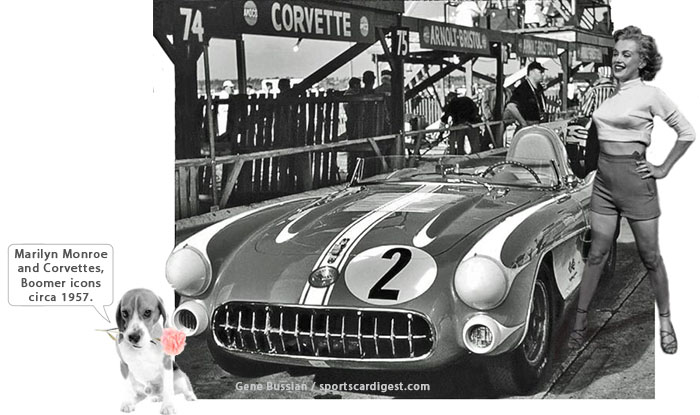Icons represent ideas that are bigger than themselves.
Myths are stories that represent ideas that are bigger than themselves.
Archetypes are symbols of recognizable patterns of behavior.
Letters of the alphabet are symbols (graphemes) that represents sounds (phonemes,) just as notes on a sheet of music are symbols that represent sounds.
A role model is a personal icon, an archetype that you have chosen to emulate.
The human brain loves symbols and patterns. This is why we embrace icons, myths, and archetypes.
When we recognize a pattern that has been stored in our subconscious, we call it intuition. When we hear a pattern that has been repeated too many times, we call it a predictable cliché.
Icons, myths, and archetypes evolve with each new generation.
I was born in the 12th year of the 18-year Baby Boom generation that began exactly 9 months and 10 minutes after the end of World War II.
Marilyn Monroe was the iconic sex symbol. The Statue of Liberty, Yankee Stadium, Yellowstone, and Woodstock were America’s iconic places. Rolls Royce, Cadillac, Corvette, Camaro and Mustang were iconic cars. Tetris, Pong, and Pac-Man were iconic video games.
The mythic stories of Baby Boomers were mostly about combat. Sometimes we fought the Indians of the Old West. Sometimes we fought the Germans, or the Japanese. We fought the Establishment. We fought for justice. Or we fought just to stay alive.
And we always won.
Our definitive male archetype in these mythic stories was rugged, brave, independent, and honorable. John Wayne, Paul Newman, Clint Eastwood, Sean Connery.
Baby Boomer female archetypes were smart, pretty, and strong; Elizabeth Taylor, Audrey Hepburn, Julie Andrews, Sophia Loren.
Lots of movies ended with a wedding.
These societal forces shaped the birth cohort known as the Baby Boomers.
Gen-X was shaped by an entirely different set of icons, myths, and archetypes.
Millennials had icons, myths, and archetypes that were all their own, as well.
The Gen-Z cohort believes it is their responsibility to straighten out everything that the Boomers and X-ers screwed up.
Gen-Alpha is determined to make their own decisions and decide for themselves what they want to do. They will be the vanguard of the next “Me” generation.
Fortunately, there are elemental beliefs that bind us all together.
It is upon those beliefs that successful customer-bonding ad campaigns are built. Openly name these beliefs and they lose their magic.
If you claim to possess them, no one will believe you.
EXAMPLES: Never claim to be honest. Just say something that only an honest person would say. Never claim to be a perfectionist. Just do something that only a perfectionist would do. Don’t tell people that you are an author or a podcaster. Just give them a copy of your book. Invite them to be on your podcast.
If you would win the hearts and minds of tomorrow’s customers, this is what you must do:
- Imagine that you are standing face-to-face with three perfect customers and they are each looking into your eyes.
- The first one says, “Talk is cheap. Don’t tell me what you believe. Show me.”
- The second customer says, “Tell me a true story that lets me know who you really are, including the price that you pay for being you.”
- Customer three says, “If you betray me after I have given you my trust, I will burn you down so hot that grass won’t grow for 100 years.”
Now you understand cancel culture. Frustration created it, and social media fuels it.
People are looking for someone who really is who they claim to be.
Is that you?
Good. Now you just need to figure out how to communicate it.
Roy H. Williams
Mick Torbay: “If you met a vegan who did Crossfit and invested in crypto and went to Harvard, which of those things do you think he would tell you about first?”
Johnny Molson: “That’s a trick question. The first thing he would do is tell you about his podcast.”
 Unlike most experts, Mike Kelley believes that leadership begins with leading yourself. Every investment you make in personal growth will pay dividends at home, at work, and in your community. Mike led the executives at Michelin and Macy’s for more than 20 years before he launched out to coach others on how to grow and guide their organizations. Listen and learn as Mike tells deputy rover Maxwell Rotbart how focusing on faith, family, fitness, friends, and fun will make you a better person, as well as a more inspiring and effective manager. It’s grow-time, go-time at MondayMorningRadio.com
Unlike most experts, Mike Kelley believes that leadership begins with leading yourself. Every investment you make in personal growth will pay dividends at home, at work, and in your community. Mike led the executives at Michelin and Macy’s for more than 20 years before he launched out to coach others on how to grow and guide their organizations. Listen and learn as Mike tells deputy rover Maxwell Rotbart how focusing on faith, family, fitness, friends, and fun will make you a better person, as well as a more inspiring and effective manager. It’s grow-time, go-time at MondayMorningRadio.com
